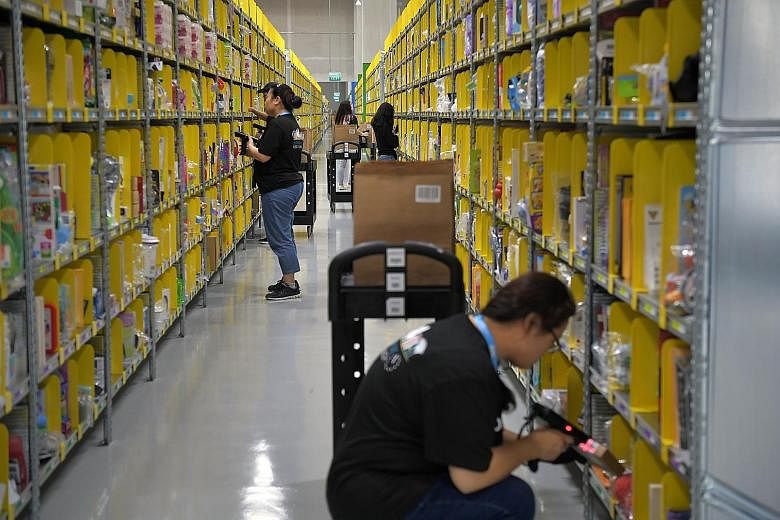As Amazon.com pushes into South-east Asia with a new venture in Singapore, the online retailer is facing some tough hurdles. Shopping in air-conditioned malls is practically a national sport, and e-commerce rivals moved in long ago.
Delivery delays also marred Amazon's debut in July, when on-the-ground operations began with Prime Now two-hour deliveries. Even when including orders placed on its main US website, Amazon lags behind local online store Lazada and its parent, Alibaba Group Holding.
For Singapore consumers, a store or a shopping centre is usually just minutes away. In fact, there are too many stores, with mall operators scaling back operations after years of over-expansion.
While retailers blame a weaker economy and increased online shopping, the country of 5.6 million trails most of the developed world when it comes to e-commerce.
Just 4.6 per cent of Singapore's retail sales took place online last year, compared with 15 per cent in Britain and 10 per cent in the United States, said Euromonitor International.
Mr Chan Hock Fai, a fund manager at Amundi Asset Management, said: "Singapore is a very small city-state, so shopping is one of the favourite pastimes for all Singaporeans."
-
4.6%
Percentage of retail sales that took place online in Singapore last year.
10%
Percentage of such sales in the US.
15%
Percentage of such sales in Britain.
Because retailing is a more mature market in the country, compared with emerging retail and e-commerce markets, "growth rates are harder to come by", he said.
At stake is a South-east Asian e-commerce market that is projected to reach US$88 billion (S$120 billion) by 2025, according to a report by Google and Temasek Holdings. While Amazon is firmly established in Japan, the Web retailer has mostly ceded China to JD.com and Alibaba.
India remains a top priority, with chief executive officer Jeff Bezos committing US$5 billion to expand and vanquish local rival Flipkart.
Ms Amanda Ip, spokesman for Amazon Prime Now, said: "We have launched Prime Now in 50 cities across nine countries, and Singapore is our biggest launch ever... We are grateful for the exciting response from customers."
Mr Ang Jin-Yan, 29, decided to use the Amazon Prime Now service when he wanted to buy a Go-Pro action camera two days before going on vacation. After that, he also ordered chilled wine for a party and other daily necessities.
"On the down side, Amazon Prime Now needs to improve the variety of offerings," said Mr Ang, a procurement manager.
In terms of scale, Lazada dwarfs Amazon locally, offering more than 30 million products, compared with tens of thousands via Prime Now. The Asian online retailer, originally founded by Rocket Internet in 2011, has more than 6.6 million unique visitors a month and has seen orders triple from 2016.
"There is huge potential for the e-commerce industry in Singapore," said Lazada Singapore CEO Alexis Lanternier. "Online shopping in this market is certainly gaining traction here ... and we believe this is the direction forward for the retail industry in Singapore."
Although Singapore-based online retailers are relatively new, consumers here have been shopping online for years, getting their merchandise shipped directly from the US, China and other places.
"The main reason shoppers continue to shop in a physical store is... the in-store experience - something irreplaceable by e-commerce," said Mr Tan Kee Yong, managing director of AsiaMalls Management, which operates six shopping centres in Singapore.
BLOOMBERG

